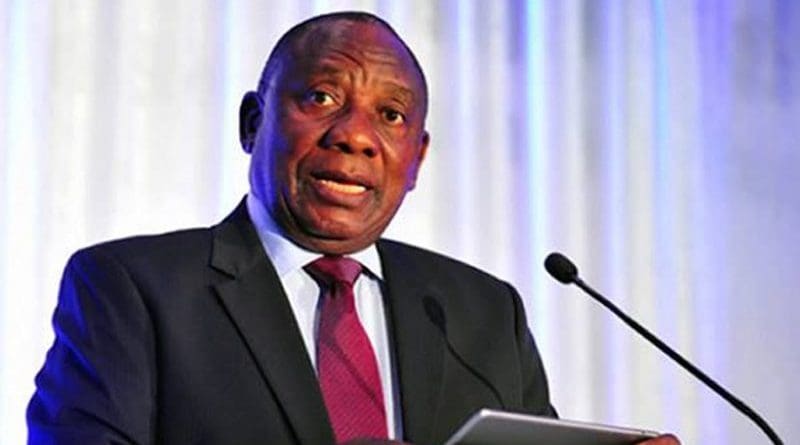Can South Africa Finally Turn The Corner? – OpEd
By Arab News
By Dr. John C. Hulsman*
One of my favorite quotes describing the human condition and political risk analysis comes, unsurprisingly, from Shakespeare. In “Julius Caesar,” Cassius turns on his friend (and fellow would-be assassin) Brutus, who is bewailing the curses of fate. Cassius will have none of it, saying: “The fault, dear Brutus, lies not in the stars, but in ourselves.” In other words, man’s failings, rather than bad luck, explain much of the world we actually live in.
So it is with South Africa. Blessed with a vital geostrategic position alongside global trading routes, endless natural resources, and (following the end of the wicked apartheid era) political peace; somehow, some way, the country has never been able to take advantage of all this structural good luck and rise to its rightful position as one of the world’s leading emerging powers. Instead, it has consistently disappointed, both in terms of macroeconomics and overall development.
The fault for this, then, lies not with the stars (which are favorably aligned for this member of the BRICS emerging power club alongside Brazil, Russia, India and China) but with the internal workings of the government of South Africa. Corruption, above all, has been the country’s snake in the garden, stifling its political and economic development for decades. But, at long last, the government of President Cyril Ramaphosa, a hesitant reformist, seems about to grasp the nettle of corruption. Victory here could finally unlock the country’s glittering possibilities.
In terms of its long-term political risk future, the pivotal moment in South Africa is now upon us. At last, feeling strong enough to pick a fight, the Ramaphosa government has this year set up a direct clash with the most toxic figures in the long-ruling African National Congress (ANC). Pleading with his party’s leaders, Ramaphosa has won the right to suspend anyone in the party apparatus who doesn’t resign over corruption allegations. This new bureaucratic weapon allows the president to take more decisive action against sleaze allegations in his effort to clean up the ANC.
It also put him on a direct collision course with Ace Magashule, the right-hand man of former President Jacob Zuma, long Ramaphosa’s chief political rival. Magashule stands personally accused of fraud, theft, corruption and money laundering, and is emblematic of the old, sleaze-tainted Zuma administration. Despite his poor international reputation, both Zuma and his cronies continue to wield significant power within the ANC, hindering Ramaphosa’s efforts to deal with the blight of past corruption at every turn.
But this gathering storm was just a foretaste of what has come to pass, as a long-running judicial inquiry into the graft scandals that plagued the Zuma years (2009-2018) has threatened to jail the former president himself for 15 months for contempt of court, as he refuses to answer its questions under oath. South Africans have long looked to their fiercely independent judiciary as a bulwark for their country’s freedoms, as the courts are viewed as a pair of clean hands, unlike the tainted executive and legislative branches in South African politics.
The inquiry is looking into charges that Zuma allowed the Gupta brothers — a well-connected family of Indian businessmen — to (for financial considerations) choose their own lackeys to lead government ministries, who in turn awarded the pair national contracts. The scandal has become known in South Africa as “state capture,” and — with the Guptas having fled the country — Zuma’s testimony has become absolutely central to the case. It is alleged that as much as 500 billion rand ($34 billion) were plundered from South Africa’s coffers through the scheme.
Predictably, Zuma has not taken this lying down, lashing out at the judiciary as biased and engaged in a partisan witch hunt, one supported by his long-time rival, Ramaphosa. While Zuma remained free pending his appeal, hundreds of his still-loyal supporters gathered outside his compound to prevent him from being taken. This was seen as a key test of the ANC’s fortitude. On Wednesday, with one hour to go before the deadline for his arrest — when the police would have had to take on his followers — Zuma voluntarily turned himself in.
The prospective jailing of the ex-president is part blessing and part curse for Ramaphosa, who succeeded Zuma in 2018. The judicial inquiry — as well as his looming duel with Magashule within the ANC — demonstrates to his own people (as well as to outside investors) that his anti-corruption campaign is both serious and is finally achieving real results.
However, now is the moment of truth in Pretoria; either Zuma as well as his lieutenant Magashule will be dealt with, or they will escape the charges, illustrating both their impunity as well as the haplessness of the South African state in dealing with the cancer of corruption. The stakes simply could not be higher, as the political contest has become binary: It is either Ramaphosa or corruption that will clearly emerge victorious.
This is a case in political risk where the outcome of such a binary contest will determine the future trajectory of the country as a whole. Either South Africa is a “rule of law” country, or it is not. If it is, at last, South Africa’s wondrous possibilities become far more likely and its trajectory is definitively altered in a positive direction. The fault (or benefit) is now entirely up to the political skill of the Ramaphosa administration itself; it is not in the stars.
- Dr. John C. Hulsman is the president and managing partner of John C. Hulsman Enterprises, a prominent global political risk consulting firm. He is also senior columnist for City AM, the newspaper of the City of London. He can be contacted via chartwellspeakers.com.

